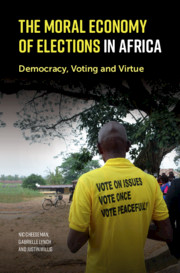Book contents
- The Moral Economy of Elections in Africa
- The Moral Economy of Elections in Africa
- Copyright page
- Dedication
- Contents
- Figures
- Tables
- Acknowledgements
- Abbreviations and Glossary
- Introduction: Writing African Elections
- 1 Towards a Moral Economy of Elections in Africa
- 2 Elections, States and Citizens
- Part I Promoting Civic Virtue
- Part II The Moral Economy in Action
- 6 Performing Virtue
- 7 Navigating Multiple Moralities
- Conclusion: The Electoral Fallacy Revisited
- Appendix 1: Research Methods
- Bibliography
- Index
7 - Navigating Multiple Moralities
Popular Expectations and Experiences of the Polls
from Part II - The Moral Economy in Action
Published online by Cambridge University Press: 15 December 2020
- The Moral Economy of Elections in Africa
- The Moral Economy of Elections in Africa
- Copyright page
- Dedication
- Contents
- Figures
- Tables
- Acknowledgements
- Abbreviations and Glossary
- Introduction: Writing African Elections
- 1 Towards a Moral Economy of Elections in Africa
- 2 Elections, States and Citizens
- Part I Promoting Civic Virtue
- Part II The Moral Economy in Action
- 6 Performing Virtue
- 7 Navigating Multiple Moralities
- Conclusion: The Electoral Fallacy Revisited
- Appendix 1: Research Methods
- Bibliography
- Index
Summary
Chapter seven investigates what voters in Kenya, Ghana and Uganda think about different forms of electoral malpractice – what is seen to be morally wrong, and what can be justified? In particular, we focus on the exchange of money and gifts around elections – a particularly powerful lens through which to understand the complexity of moral claims making. We find that money is more likely to be handed out where political parties are institutionally weaker and politics has become more personalised, as in Kenya. We also find that the way voters think about the distribution of money is shaped by their understanding of the candidate and the meaning of the gift. Leaders who are seen to be authentic and who have a sustained relationship with an individual or a community can have their reputation bolstered by making handouts; in this context, gift-giving is usually seen as an act of generosity and evidence of “good” leadership. By contrast, those who lack moral authority are vulnerable to being accused of “vote buying” – a largely illegitimate activity in all three countries. In this way, a focus on gift-giving reveals why some leaders do not benefit from handouts, and hence why the individuals who hand out the most money do not always win.
- Type
- Chapter
- Information
- The Moral Economy of Elections in AfricaDemocracy, Voting and Virtue, pp. 250 - 288Publisher: Cambridge University PressPrint publication year: 2021

